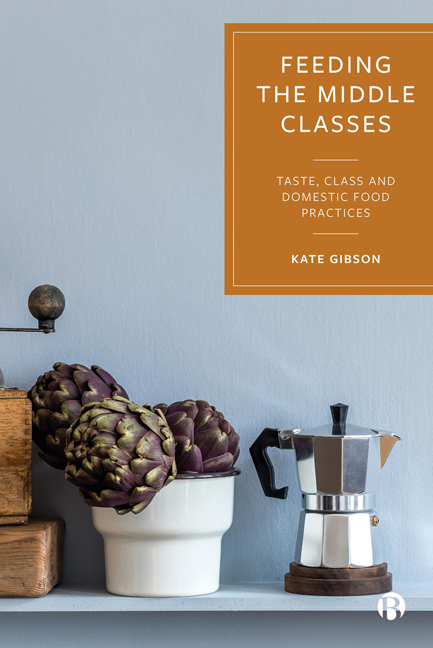Book contents
- Frontmatter
- Contents
- List of Figures and Table
- Acknowledgements
- 1 Introduction
- 2 Class, Consumption and the Domestication of Food
- 3 Talking Food: Classed Narratives, Social Identities and Biographical Transitions
- 4 Homemade Food: Individualized Processes of Household Investment
- 5 Culinary Capital: Knowledge, Learnt Practice and Acquired Taste
- 6 Conclusion
- References
- Index
2 - Class, Consumption and the Domestication of Food
Published online by Cambridge University Press: 27 March 2024
- Frontmatter
- Contents
- List of Figures and Table
- Acknowledgements
- 1 Introduction
- 2 Class, Consumption and the Domestication of Food
- 3 Talking Food: Classed Narratives, Social Identities and Biographical Transitions
- 4 Homemade Food: Individualized Processes of Household Investment
- 5 Culinary Capital: Knowledge, Learnt Practice and Acquired Taste
- 6 Conclusion
- References
- Index
Summary
This chapter begins by engaging with debates about class and identity, paying particular attention to the concept of habitus. This permits me to then consider how middle-class identities are positioned as synonymous with authorized ideas of individuality. I then mobilize these conceptual tools in order to evaluate sociology of consumption literature and more specifically the consumption of food. Here, I engage with the cultural omnivore thesis to locate food consumption within increasingly fragmented dynamics of taste. The final section of the chapter engages with literature which accounts for the material and symbolic ways in which food comes to be incorporated into the home. The chapter concludes by focusing on the relationship between time, domestic practice and gender. This provides the foundations from which to consider how eating and feeding others in the domestic sphere relates to classed and gendered performances of authorized identities.
Class and identity matters
In the 1990s, sociology underwent a retreat from class. Materialist approaches to class analysis which focused on the division of labour were increasingly posited as redundant, and the fragmentation associated with post-industrialization meant that traditional understandings of class composition were being transformed. With the apparent decomposition of collective categories came theoretical ideas about reflexive individualism and the argument that structural moorings, such as class, were no longer a relevant category of analysis for investigations of inequality. As Beck argued ‘the notion of a class society remains useful only as an image of the past’ (1992: 91). Instead, inequality was increasingly understood as an individualized project: ‘the inequality of dealing with insecurity and reflexivity’ (1992: 98; italics original).
In recent years there has been a move to reinstate the importance of class in British sociology by incorporating the interplay between economic, cultural and social resources. For instance, the Great British Class Survey’s attempt to drive forward a multidimensional way of thinking about class was met with overwhelming popularity when seven million people clicked on the BBC’s ‘Class Calculator’ within a week of its launch (Savage et al 2015). Clearly, class positioning is a keen point of intrigue to fractions of the British public, but it is also a contentious topic.
- Type
- Chapter
- Information
- Feeding the Middle ClassesTaste, Class and Domestic Food Practices, pp. 20 - 44Publisher: Bristol University PressPrint publication year: 2023



